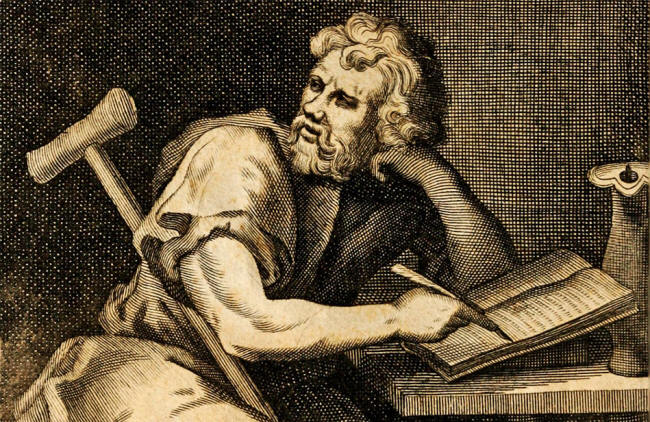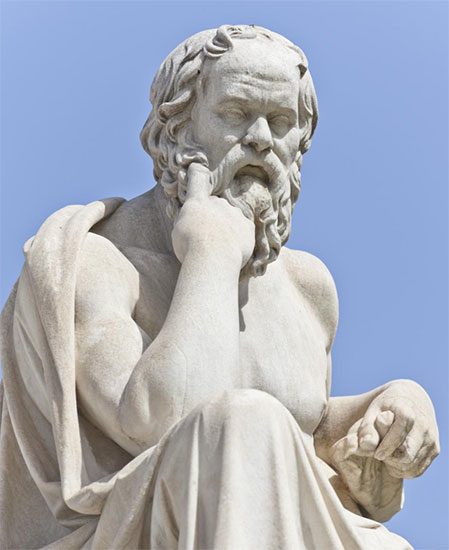|

by W.D. James
teaches philosophy in Kentucky, USA.
January 26, 2024
from
WinterOak Website

Epictetus
Life can be so easy
Life can be so hard
Make you wanna cuss and fuss
Make you wanna tear things all apart
You try to stay calm and not act a fool
Cedric Burnside,
Hard to
Stay Cooli
Epictetus (roughly 50-135 AD), was born into slavery in a
Greek colony in modern-day Turkey, which was part of the Roman
Empire at the time.
His name is not in fact a proper name. It means
'acquired'. So, the name by which he was known simply denoted his
status as property. How ironic (and apropos) then that he became a
preeminent philosopher of freedom.
We don't know the circumstances, but he gained
his freedom sometime around midlife. He set up as a philosopher in
Rome, but was banished along with all the other philosophers by the
Emperor Domitian in the 90s and relocated to northern Greece and
opened a successful school of philosophy.
Later in life he may have had more positive
contacts with Roman Emperors.
In the next century, the Emperor Marcus
Aurelius, known as one of the 'Five Good Emperors,' would
recognize his intellectual debt to Epictetus. Aurelius himself was a
student of Stoic philosophy and his Meditations is considered a
classic text in the Stoic tradition. ii
As with Diogenes, we have no writings of Epictetus
that come directly from him. However, his student, Arrian, copied
down lectures and exchanges he had with students in the book known
as The Discourses.
Further, a summary was made by taking key
passages from the Discourses and condensing them into a handy little
summary of Epictetus' teaching known as the Enchiridion or
Handbook. iii
So, our source material is better than with
Diogenes' scattered fragments.
Epictetus was known for his resilience and ability to help build
resilience in others. A famous story has his owner wrenching
Epictetus' leg, Epictetus telling him that if he keeps doing that
the leg will break.
When the snap is heard, Epictetus says,
"I told you that would happen."
Of course, there are no images of Epictetus from
his own day, but in later ages it was customary to present Epictetus
with a crutch as he walked with a limp for the rest of his life.
In the modern era, Admiral James Stockdale,
best known as the Vice-Presidential running-mate of the populist
independent candidate Ross Perot in the U.S. Presidential Election
of 1992, is an exemplar of Stoic fortitude.
Earlier in life (but at 42, he was no young man),
in 1965, he was a fighter pilot in the U.S. Navy and was shot down
over North Vietnam.
He ejected from his plane, but broke both of his
legs (Stockdale too would be 'lame', walking with two canes for the
rest of his life) and was captured by the North Vietnamese.
He was kept, shackled, in a very small and
unhygienic cell for nearly 8 years. He and his fellow prisoners
would be physically and psychologically tortured on a routine basis
for the duration of those years.
Stockdale attributed his ability to hold up under
these circumstances to the teaching of Epictetus.
In college, a professor had turned him on to the
Enchiridion and he had memorized some of the key passages and
principles in the work and relied on practicing these while a
captive. iv
Stoicism
The Stoic school of philosophy was founded by Zeno of
Citium around 300 BC in Athens.
'Stoic' means 'porch.'
The first Stoics taught while walking along a
covered and columned walkway which ran along one side of the
marketplace in Athens.
It rose to prominence as the self-sufficient
Greek city-states gave way to empires, first that of Alexander
and then to that of Rome. It is well suited to people who have lost
the relative freedom and agency that come with residing in small
communities and find themselves very small and very powerless in an
imperial setting.
All of the most prominent Stoics were actually
later Romans, as was Epictetus.
Other prominent Roman Stoics include Epictetus'
teacher Musonius Rufus and Seneca. In many ways,
Stoicism became the unofficial philosophy of the Roman Empire with
numerous adherents and academies all over the Roman world.
This may also account for why Stoicism is
experiencing a real revival in our own day as the individual is
increasingly subsumed into a global regime he or she can do little
to control.
In terms of its strenuousness, Stoicism can be situated between
Cynicism and Aristotelianism. As noted in a previous
essay, the Stoics held great respect for the Cynics, but felt they
had overdone it on the asceticism and break from society.
However, they felt Aristotle was not strenuous
enough. He had famously argued that happiness, or flourishing
(eudemonia), required virtue, but that virtue was not sufficient:
one also needed certain external goods like a measure of wealth, the
ability to participate in political self-governance, and to some
extent just good moral luck.
The Stoics wanted to return to what they saw as
the Socratic doctrine that virtue (moral excellence) was sufficient
for happiness.
In a 1915 address, which I think is still one of
the best and most helpful explications of Stoic thought,
Gilbert Murray put it like this:
"Rank, riches, social distinction, health,
pleasure, barriers of race or nation - what will these things
matter before the tribunal of ultimate truth?
Not a jot. Nothing but goodness is good. It
is what you are that matters..." v
That fierce logic, goodness is good, and
nothing else is, is at the heart of the existential hardiness of
a life lived according to Stoic principles.
In this and the next essay, we will look more closely at the
teaching and practice of Epictetus.
Here we will look at his focus on freedom.
In the next essay we will look at his teaching on Natural Law and
virtue. For the Stoics, it is reason that links all of those things
together.
It is, however, a very expansive and holistic
conception of reason.
As Hadot explains:
For the Stoic, the same Reason was at work in
nature (and physics), in the human community (and ethics), and
in individual thought (and logic).
The single act of the philosopher in training
for wisdom thus came to coincide with the unique act of
universal Reason, which is present within all things and in tune
with itself. vi
This points to the three-legged stool (the Stoics
also used a garden and an egg as analogies) of the components of a
comprehensive Stoic philosophy:

With the Romans, ethical reflection came to take
center stage while the other components drifted into the background.
The Stoic path is one of self-possession, moral striving, a
resilient freedom...
Philosophic Practices
As with Diogenes, we will begin the exploration of each
practice with a set of quotations.
We will then develop what the spiritual exercise
behind them involved and, finally, extrapolate practices of
resistance.
Practice 1:
The dichotomy of control
Happiness and freedom begin with a clear
understanding of one principle:
Some things are within our control,
and some things are not.
It is only after you have faced up to
this fundamental rule and learned to distinguish between
what you can and can't control that inner tranquility and
outer effectiveness become possible.
Within our control are our own opinions,
aspirations, desires, and the things that repel us.
These areas are quite rightly our
concern, because they are directly subject to our influence.
We always have a choice about the contents and character of
our inner lives.
Outside our control, however, are such
things as what kind of body we have, whether we're born into
wealth or strike it rich, how we are regarded by others, and
our status in society.
We must remember that those things are
externals and are therefore not our concern. Trying to
control or to change what we can't only results in torment.
Remember:
The things within our power are
naturally at our disposal, free from any restraint or
hindrance; but those things outside our power are weak,
dependent, or determined by the whims and actions of
others. (3) vii
In knowing and attending to what actually
concerns you, you cannot be made to do anything against your
will; others can't hurt you, you don't incur enemies or
suffer harm. (4)
If...you avoid only those undesirable things that are
contrary to your natural well-being and are within your
control, you won't ever incur anything you truly don't want.
(6)
Don't demand or expect that events happen as you would wish
them to. Accept events as they actually happen. That way
peace is possible. (15)
People don't have the power to hurt you. (27)
With the first extended quotation, we get
Epictetus' presentation of what later philosophers termed
'the dichotomy of control'...
Things are either in our control or they are
not. This is the strict logic that everything in existence is
either 'A' or 'not A'.
The logic is solid, but it probably strikes
us as too black and white. Yes, some things I control. Yes, some
things I do not control.
But aren't some of the things in the list
under 'don't control' things I have some control over (like my
body or my reputation)?
Contemporary philosopher William B. Irvine,
in A Guide to the Good Life: the ancient art of stoic joy
(Oxford, 2009), develops Epictetus' idea into a 'trichotomy of
control.'
Things are either in our control, not in our
control, or somewhat in our control. This preserves Epictetus'
logic and the moral implications of the teaching however.
Those things which are somewhat in our
control really have two facets, one of which is in our control
and one which is not: it just helps us apply Epictetus' logic in
ways that fit with our common sense better.
For instance, to take an example Irvine uses,
I might want to win a tennis match.
Since this involves externals, Epictetus
would have counseled this should remain indifferent to us:
we should not really desire it (though
perhaps we could prefer it).
Irvine analyses this in terms of what is and
is not in our control when it comes to winning a tennis match.
How good the other player is, what the court
conditions will be, etc... are not really up to us.
That I intend to practice hard (the actual
practice might get interrupted by circumstances beyond my
control, but the intention is mine to determine), that I attempt
to follow my coach's advice, that I do my best on the day of the
match:
these are up to us and will influence the
outcome of the match.
Irvine says there is nothing wrong, from a
Stoic perspective, in wanting to practice hard, follow my
coach's instruction, and playing hard.
That is where I should focus my attention and
desire.
Nothing can prevent me from that and they
will increase the chances of victory. Nevertheless, having done
all that, I should tranquilly accept the outcome of the match.
Freedom can be understood in a rudimentary fashion as being able
to do what I want to do.
We moderns focus on making the world such
that I can have as many 'wants' as possible and the world will
oblige me in fulfilling as many of them as possible.
The ancients focused on what the Stoics would
have called the other 'handle'. I can seek to discipline my
'wants'. If I only want what is in my control, I will always be
free (though possibly externally in chains).
The teaching is simple:
desire what is in your control
(primarily, desire to be good) and you will be free,
unimpeded, and happy.
Desire what is not in your control and
you will not be free, others and the world will thwart your
desires, and you will be frustrated.

Morally this is rooted in the Socratic dictum that.
'A bad man cannot harm a good man.'
If our true good rests solely on being good,
nothing external can diminish that. Yes, a bad man might kill
you, enslave you, cause you pain, and take your possessions.
Epictetus certainly knew that and experienced
that. However, Socrates and Epictetus would insist these do not
constitute 'harm.'
The only essential thing is to be good.
Genuine harm would come from becoming bad.
That is not in the power of others, but only in our own power.
We may choose to become bad but no one can make that choice for
us. If my fundamental desire is to be good, I remain free to do
that.
If I choose to do that I am also happy (the
choice itself constitutes me as good), though externally I may
have many disadvantages. This establishes what later Stoics
called 'the inner citadel.'
With this worldview and this discipline I
establish an impregnable inner source of strength.
Cedric Burnside, in the song quoted above, is dealing
with the same reality. It's hard to stay cool. Maybe you won't.
But that remains the goal.
The Blues can be seen as an extended
meditation on how to maintain your 'cool' in adverse
circumstances.
Practice 2: Negative
visualization
As an exercise, consider the smallest
things to which you are attached.
For instance, suppose you have a favorite
cup. It is, after all, merely a cup; so if it should break,
you could cope. Next build up to things - or people - toward
which your clinging feelings and thoughts intensify.
Remember, for example, when you embrace
your child, your husband, your wife, you are embracing a
mortal.
Thus, if one of them should die, you
could bear it with tranquility. When something happens, the
only thing in your power is your attitude toward it... (7)
We come to what may be the hardest Stoic
practice or spiritual exercise.
In a mild version we call it 'negative
visualization.' The practice would consist of thinking of all
the negative things that might happen to you.
Imagine them. Then think along Stoic lines to
try to put them into perspective.
Finally, think of how you would and should
respond if that negative thing came about. If the universe is
kind to you and the thing does not happen, be grateful. If it
does, at least what might have been a crushing blow will be
something you are better equipped to handle.
Epictetus is actually pushing this point a bit further though.
It starts with clearly recognizing and accepting what things
actually are. Cups are fragile articles. Humans are mortals. The
former will eventually be broken and the latter will eventually
die.
That doesn't mean we can't enjoy cups and
love people. It does mean we can't reasonably expect cups to
never get broken and people to never die. We should not desire
this but we also should not desire the opposite.
If we do, our desires are out of alignment
with what things are and how existence is. You will be unhappy
if your desires are out of alignment with reality.
It is from teachings like this that Stoicism gets its reputation
for being cold, a reputation I think that is not really
deserved.
The Stoics would say it is perfectly
reasonable to love your child. In fact, they say that as we are
all children of God (meaning something like a panentheistic
universe) we should love everyone.
Also, it is natural to be sad when a loved
one dies. But there are limits. We are not to be destroyed when
this happens. We are to mourn and then to accept this is how
things are (trusting in what they see as an ultimately
providential order).
What healthy alternative, is there really?
Practices of
Resistance
The
dichotomy of control
-
We can easily be overwhelmed with all the
problems and malevolence we see around us.
-
First, sort out what is within your
control and what not.
-
Prefer the good. Prefer truth to
propaganda, justice to oppression, virtue to vice, etc....

-
However, desire what you can control: to
come to know the truth, to love justice, to acquire virtue.
This is where Stoicism yields its practical effectiveness.
-
In this way, you will form an inner
citadel that the malevolent forces of the world cannot
assail.
-
You will remain free.
-
Influence the world and those around you
within the bounds of your power.
-
We may still lose. That is possible.
-
We may win. That is possible.
-
We will marshal our power most
effectively if we are not depressed and downtrodden because
it is a hard struggle or one that is not solely up to our
actions.
-
The virtuous defeated remain virtuous.
For the Stoics, that was a sufficient basis from which to
live and enjoy happiness.
-
The virtuous victorious remain virtuous
and the world is made better. Be grateful. Providence favors
this outcome.
Negative visualization
-
It is a good world, but it is not an easy
world.
-
Love the truth.
-
Do not accept lies, and by all means do
not impose wishful lies on yourself.
-
Understand reality; what the natures of
things are.
-
Do not expect nature to be other than
nature is.
-
Experience and feel natural sentiments,
but balance these with a reasonable understanding of how
things are.
-
Injustice and oppression have their day,
but they are not within the nature of things.
-
Imagine trials and tribulations you will
encounter if you put yourself on the side of justice and
freedom. Prepare in advance to meet those head-on.
-
Realize there could well be costs. Weigh
those. Decide how you will respond if those costs are
imposed.
-
Remember Epictetus when his cruel master
was breaking his leg and Stockdale in his cell and under the
torturer's power. They persevered. You have the same nature
they did.
-
They, not their adversaries, became the
inspirers of future generations.
References
-
Listen to the whole song here:
Cedric Burnside- "Hard to Stay Cool"
(OFFICIAL VIDEO) -
YouTube
-
As an historical and pop culture
footnote, Aurelius shows up in the film Gladiator (2000),
played by Richard Harris. He is the good but very old
Emperor who dies early in the film.
-
As with Diogenes, I have opted for a
non-literal but more flavorful translation that seeks to
capture Epictetus' meaning:
Epictetus, The Art of Living: The
Classic Manual on Virtue, Happiness, and Effectiveness,
translated and interpreted by Sharon Lebell,
HarperSanFrancisco, 1995. This contains the whole of the
Enchiridion as well as a few supplemental passages from
The Discourses.
-
See James Bond (honestly, that's his
name) Stockdale, Courage Under Fire: Testing Epictetus's
Doctrines in a Laboratory of Human Behavior, Hoover
Institution on War, Revolution, and Peace, 1993.
-
Gilbert Murray, The Stoic Philosophy, G.P.
Putnam's Sons, 1915, pp 30-31.
-
Pierre Hadot, What is Ancient
Philosophy?, translated by Michael Chase, Belknap Press of
Harvard University Press, 2002 (original French edition,
1995), p. 139.
-
For the sake of simplicity, I will not
separately footnote each quote from Epictetus. I will just
note the page number on which the quote occurs in the Lobell
text.
|





